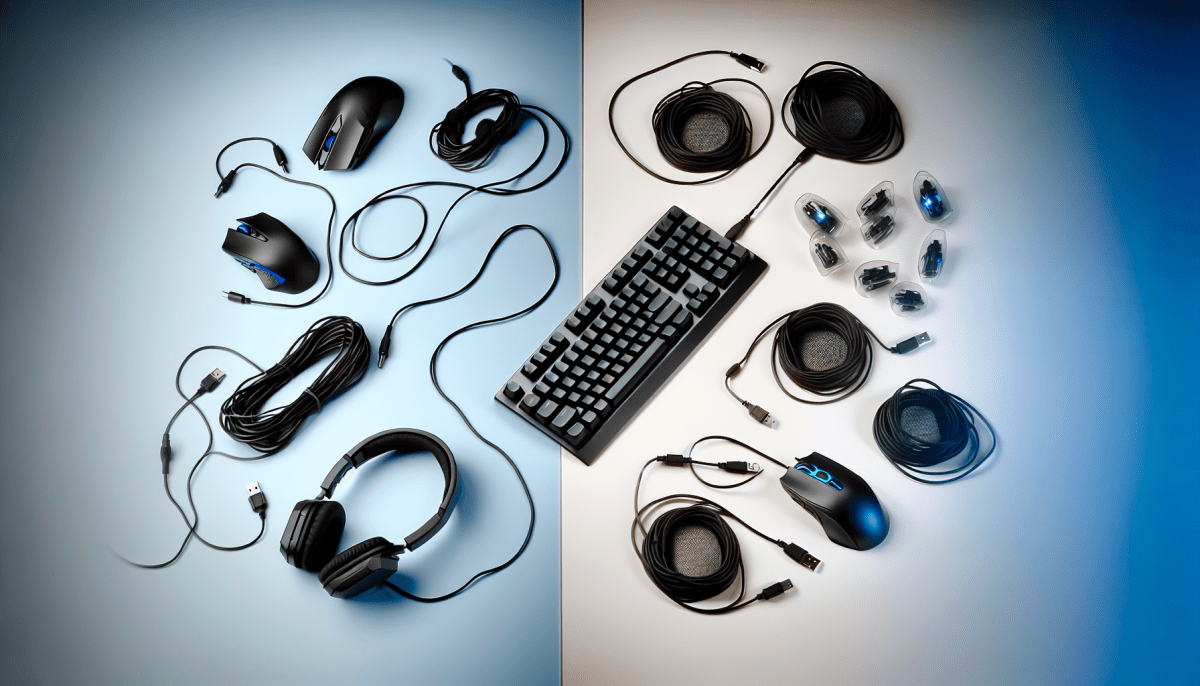Wired gaming accessories offer several distinct advantages that can enhance your overall gaming experience. One of the biggest benefits is the reliability of a wired connection. Unlike wireless devices, which can suffer from interference or signal drops, wired accessories maintain a stable connection. This consistency is crucial during intense gaming sessions where every millisecond counts. Gamers can enjoy a smoother performance without the worry of losing connection in the heat of battle.
Another significant advantage of wired gaming accessories is their latency. Wired devices generally have lower latency compared to their wireless counterparts. This means that actions are transmitted to your gaming system almost instantaneously. For competitive players, where timing is everything, a lower response time can make a difference between winning and losing. Whether it's a mouse, keyboard, or headset, the direct connection of a wire ensures that your commands are executed as quickly as possible.
Durability and ease of use are also important benefits of wired gaming accessories. Wired devices tend to have a longer lifespan since they don’t rely on a battery that might need replacing or could run out during gameplay. Plus, setting up wired accessories is typically straightforward—just plug them in, and you’re good to go. You won’t have to worry about charging batteries or connecting to Bluetooth, making wired accessories a hassle-free choice.
Finally, wired gaming accessories often provide better performance in terms of audio and video quality. For example, wired headsets can deliver superior audio without compression, resulting in clearer sounds and immersive gameplay. Similarly, wired controllers usually have better feedback and responsiveness, allowing for a more enjoyable gaming experience. All these factors contribute to why many gamers still prefer wired accessories, even in an increasingly wireless world.
Advantages of Wireless Gaming Gear
Wireless gaming gear has become increasingly popular among gamers for several compelling reasons. One of the primary advantages is the freedom of movement it offers. Players can enjoy their favorite games without being tethered to a console or computer, allowing for a more dynamic and comfortable gaming experience. This freedom is especially beneficial in fast-paced games where quick reflexes and movements can mean the difference between victory and defeat.
Another significant advantage of wireless gaming accessories is the convenience of setup. With no cables to deal with, players can quickly set up their gaming stations and easily relocate their gear as needed. This ease of use makes wireless peripherals ideal for gamers who enjoy hosting friends or attending gaming events, where space and mobility are often at a premium.
Battery life and technology have also improved dramatically in recent years. Many wireless gaming devices now offer extended battery life, allowing for long gaming sessions without interruption. Additionally, advancements in wireless technology have led to minimal lag and interference, giving gamers a seamless experience that rivals traditional wired options. High-quality wireless gaming mice and headsets now deliver impressive performance, making them a viable choice for serious gamers.
Finally, wireless gaming gear often boasts a sleek design that appeals to gamers looking for a stylish setup. These devices can add a touch of modernity to any gaming rig, eliminating the clutter of cables and allowing for a cleaner aesthetic. With customizable RGB lighting and ergonomic designs, wireless peripherals can enhance both the functionality and visual appeal of a gaming environment.
Comparing Performance and Latency
When it comes to gaming, performance and latency are crucial factors that can make or break your experience. Wired connections, like Ethernet cables, are traditionally known for their stability and speed. They provide a direct line to your router, minimizing any interference or signal degradation. This means that when you're in the middle of a high-stakes game, you can expect a smoother performance with lower ping times. Gamers often prefer wired setups for activities like competitive play, where every millisecond counts.
On the other hand, wireless gaming has come a long way in terms of technology. Modern Wi-Fi standards, such as Wi-Fi 6, offer impressive speeds and improved latency compared to previous generations. While wired connections typically boast lower latency, high-quality wireless gear can provide a surprisingly competitive experience. Many gamers appreciate the freedom of movement that comes with wireless devices, allowing them to play comfortably from their couch or bed without being tethered to a gaming station.
However, it’s essential to recognize the potential downsides of wireless setups. Factors such as distance from the router, physical obstacles, and even the number of devices connected to the network can introduce lag and affect performance. While modern wireless technology aims to mitigate these issues, a wired connection still generally offers greater reliability under heavy loads. Thus, for players who prioritize uncompromised performance, turning to wires may still be the best choice.
Ultimately, the decision between wired and wireless will depend on individual gaming needs and preferences. Casual gamers may find that a wireless setup suits their lifestyle just fine, enjoying the convenience and flexibility it offers. Conversely, those who engage in high-intensity gaming sessions or competitive play might lean towards the tried-and-true, low-latency benefits of a wired connection. Knowing these differences can help gamers choose the right configuration for their ultimate gaming setup.
Price and Value Considerations
When considering gaming accessories, price and value are two crucial factors that can significantly impact your experience. Wired devices often come with a lower initial cost compared to their wireless counterparts. This is primarily because wired accessories tend to be simpler in design and technology, making them more affordable for manufacturers to produce. Gamers on a budget may find that wired options offer a solid performance without breaking the bank.
On the other hand, wireless accessories can sometimes carry a higher price tag due to the added convenience and technology they provide. These devices often feature advanced battery management systems and wireless connectivity, which require more sophisticated components. While the upfront cost may be higher for wireless gear, the increased freedom of movement and lack of cable clutter can elevate your gaming experience. For many players, this added value justifies the expense.
It's important to weigh the long-term value of an accessory as well. A higher-priced wireless headset might last longer and offer more features than a cheaper wired alternative. Additionally, consider warranties and customer service policies, as these can also influence value over time. Ultimately, the best choice depends on your specific gaming habits and preferences, as well as how much you’re willing to invest in your setup.



